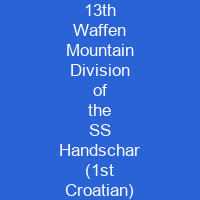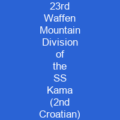The 13th Waffen Mountain Division was a mountain infantry division of the German Nazi Party. It served alongside but was never formally part of the Wehrmacht during World War II. From March to December 1944, it fought a counter-insurgency campaign against communist-led Yugoslav Partisan resistance forces in the Independent State of Croatia.
About 13th Waffen Mountain Division of the SS Handschar (1st Croatian) in brief
 The 13th Waffen Mountain Division of the SS was a mountain infantry division of the German Nazi Party. It served alongside but was never formally part of the Wehrmacht during World War II. From March to December 1944, it fought a counter-insurgency campaign against communist-led Yugoslav Partisan resistance forces in the Independent State of Croatia. It was given the title Handschar after a local fighting knife or sword carried by Ottoman policemen during the centuries that the region was in the Ottoman Empire. The division fought briefly in the Syrmia region north of the Sava river prior to crossing into northeastern Bosnia. Over the winter of 1944–45, it was sent to the Baranja region where it fought against the Red Army and Bulgarians throughout southern Hungary, falling back via a series of defensive lines until they were inside the Reich frontier. Most of the remaining members became prisoners of the British Army. 38 officers were extradited to Yugoslavia to face criminal charges, and 10 were executed. Hundreds of former members of the division fought in the 1947–48 Civil War in Mandatory Palestine and the 1948 Arab–Israeli War. It earned a reputation for brutality and savagery, not only during combat operations, but also through atrocities committed against Serb and Jewish civilians. Muslims were underrepresented in government positions, comprising only two of 20 ministerial positions, none of the six state secretaries was a Muslim, and there were only 13 Muslim people representatives in a total of 206.
The 13th Waffen Mountain Division of the SS was a mountain infantry division of the German Nazi Party. It served alongside but was never formally part of the Wehrmacht during World War II. From March to December 1944, it fought a counter-insurgency campaign against communist-led Yugoslav Partisan resistance forces in the Independent State of Croatia. It was given the title Handschar after a local fighting knife or sword carried by Ottoman policemen during the centuries that the region was in the Ottoman Empire. The division fought briefly in the Syrmia region north of the Sava river prior to crossing into northeastern Bosnia. Over the winter of 1944–45, it was sent to the Baranja region where it fought against the Red Army and Bulgarians throughout southern Hungary, falling back via a series of defensive lines until they were inside the Reich frontier. Most of the remaining members became prisoners of the British Army. 38 officers were extradited to Yugoslavia to face criminal charges, and 10 were executed. Hundreds of former members of the division fought in the 1947–48 Civil War in Mandatory Palestine and the 1948 Arab–Israeli War. It earned a reputation for brutality and savagery, not only during combat operations, but also through atrocities committed against Serb and Jewish civilians. Muslims were underrepresented in government positions, comprising only two of 20 ministerial positions, none of the six state secretaries was a Muslim, and there were only 13 Muslim people representatives in a total of 206.
The NDH authorities, led by the Ustaše Militia, implemented genocidal policies against the Serb, Jewish and Roma population living within the borders of the new state. The Muslims received protection from the Croatian Home Guard, the regular army of the NDH, whom the Germans described as “of minimal combat value”. Local militias were raised, but these were also of limited value and only one, the Tuzla-based Hadžiefendić Legion, was of any significance to any Bosnian elite and not in various cities and towns along the Bosnian-Herzegovina border. In an effort to secure the loyalty of Bosnian Muslims, Ante Pavelić ordered that a property in Zagreb be converted into a mosque that he named the \”Poglavnik’s Mosque\”. The Muslims quickly became dissatisfied with Croatian rule and tried to return to Bosnia. Although this was an overstatement, a Muslim leader reported that not one Muslim occupied an influential post in the administration. In late 1944, parts of the Division were transferred briefly to the Zagrebi area, after which the non-German members began to desert in large numbers. The rest retreated further west, hoping to surrender to the Western Allies. The remaining members were eventually captured by the Allies and sent to prison in the Netherlands and later to the United States, where they served as POWs. They were later released and returned to Bosnia in the 1950s and 1960s. In the 1990s, the division was reformed and renamed the 13th Mountain Division.
You want to know more about 13th Waffen Mountain Division of the SS Handschar (1st Croatian)?
This page is based on the article 13th Waffen Mountain Division of the SS Handschar (1st Croatian) published in Wikipedia (as of Dec. 07, 2020) and was automatically summarized using artificial intelligence.







